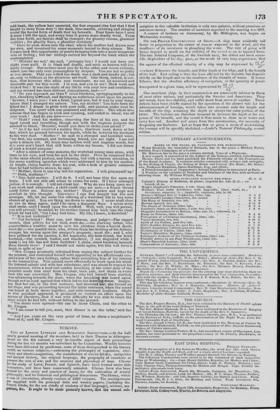SCIENCE.
CITY OF LONDON LITERARY AND SCIENTIFIC INSTITUTION.-.-At the half- yearly general meeting of the members, held in their Theatre in Aldersgate- street on the 4th current, a very favourable report of their proceedings during the last six months was submitted by the Committee. Weekly lectures have been delivered by gentlemen, some of them distinguished in the literary world, on various subjects,—embracing the philosophy of vegetation, elec- tricity and electro-magnetism, the manufacture of woven fabrics, antiquities and ancient history, the oriainal language, the geography of countries at present the seat of war, and 'the anatomy and physiology of man: Classes' for the study of Latin, French, and Spanish, have been formed 'under able instructors, and have been numereusly..attended. Classes .hatie also been formed for. the .study and practice of music, for the cultivation. of mental philosophy, and for historical and philological discussions. The library, which is one of circulation, already consists or 2362 volumes. The reading-rooms are supplied with the principal daily and weekly papers, (including the French Globeyfor the use chiefly of students of that language), reviews, ma- gazines, &c. It ought to be wade generally known) that the annual sub.
scription to this valuable institution is only two guineas, without premium or entrance-money. The number of members reported to the meeting was 669. A course of lectures on Astronomy, by Mr. Millington, was begun on Wednesday evening.
ON THE PROPER CONSTRUCTION OF SHIPS.—A ship must evidently sail faster in proportion to the extent of canvas exposed to the wind, and the smallness of its resistance in ploughing the water. The rate of going will hence depend as much on the stability of the vessel as on its tapered form. The late Admiral Chapman, of the Swedish navy, the ablest and most scien- tific shipbuilder of his day, gave, as the result of very long experience, that the square of the effectual velocity of a ship may be expressed by 113.1:
—where B denotes the breadth, and D the depth at the bilge, and L the length of the hull. Fast sailing is thus the least affected by the breadth, but depends chiefly on the length and on the smallness of the draught of water. It hence folluws, that the absolute efficiency of navigation, or the quantity of goods
transported in a given time, will be represented by -4 -
Da •
Our merchant ships in their construction are notoriously inferior to those of most other nations, and particularly the Swedes and Americans. They sail worse, have less stability, and suffer more from stress of weather. These defects have been chiefly caused by the operation of the absurd rule for the admeasurement of tonnage, which takes into account only the length and breadth of the ship, assuming the depth as always the same portion of the latter. The builders are therefore tempted to increase the depth at the ex- pense of the breadth, and the vessel is thus made to draw mere water and carry less sail. Another evil arises from this construction, the necessity of deepening our harbours. Let us hope that so gross a mode of ascertaining the tonnage will be speedily abolished.—Leslie's Natural Philosophy, second edition.
















 Previous page
Previous page